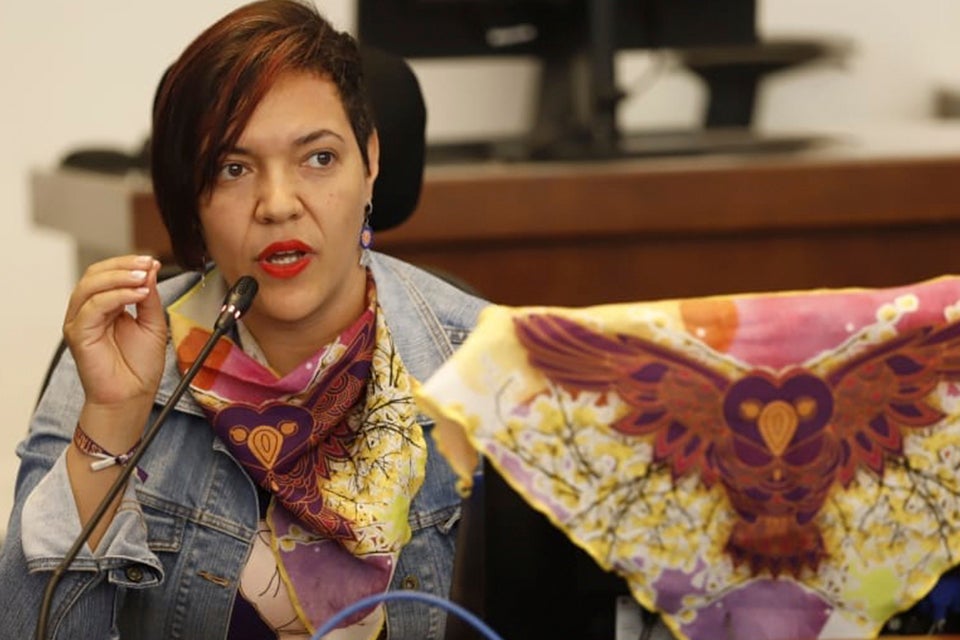Women in leadership: Dora Saldarriaga, lawyer and advocate for gender parity in politics in Colombia.
Dora Saldarriaga leads the first Legal Commission for Women's Equity in a Municipal Council in Colombia. Her inspiration: collectivity with other women. "Without feminist leadership equality will not be possible," she warns.Date:

"If it were not for all those women who have fought before us, I would not be a councilwoman," says Dora Saldarriaga.
A lawyer from Santa Helena, a rural area of the city of Medellin, Colombia, she began her activism by exposing the inequalities and various problems that exist in the countryside.
All this led her to encounter the issues of gender and feminism during her time as a professor at the Universidad Autónoma Latinoamericana: "that is where I began my activism in feminist litigation," she says.
This experience is what led other women, also interested in leadership, to invite her to join the women's political movement 'Estamos listas' (We are ready), which revolutionized politics in Medellin in the last council elections and in which Dora was elected councilwoman.
Her political approach is linked directly to her feminist roots, she says, is "to collectivize the participation of women because together we advance faster". And it was precisely this collectivity that led her, along with other colleagues, to establish and become the president of the first Legal Commission for Women's Equity of a Municipal Council in Colombia.
"The fact that she was appointed councilwoman and not councilman is already a gain in favor of equality," says Dora. Her debates in the Medellín City Council have been based on the feminist agenda that diferentiates her as a woman in politics.
"It is my agenda, my roadmap, not an annex in the movement I am part of, as it happens in many political parties in our country". This has led Dora to demand, for example, disaggregated data from the local government and all office secretaries to account for the reality of women in her city.
"They may be small achievements, but it is a huge leap for the women of my city."
Feminism at the center of the Colombian public debate
From the Medellín City Council, Dora has led the analysis of the gender budget to cover the needs of women in the pandemic and in the social and economic reactivation in response to the impacts of the pandemic.
Additionally, along with her colleagues, she has led the Buscarlas hasta Encontrarlas (Search for Them Until You Find Them) strategy, which has succeeded in locating the whereabouts of missing women and girls, many of whom are still alive. In this regard, Dora comments that ts’s not an issue of whether or not they searched for missing women in Medellín, but that "they were searched for under a patriarchal logic that justified the disappearance. With this strategy we have managed to look at the issue through a different lens, under a human approach," says Dora.
In addition to Buscarlas hasta Encontrarlas, Saldarriaga states that progress has been made in terms of the political control of the issue of sexual harassment in the Mayor's Office of Medellín, advocating for the protection of the female employees of that entity.
"We’ve hired an expert to implement the sexual harassment protocol.”Regarding the pandemic and the urgency for the economic reactivation of women in Colombia, "several agreements have been signed with the local administration in Medellin to advance in the reduction of inequalities in this sector of the infrastructure, which was one of the first to resume work, making it possible to hire more women in the system," says Dora.
Regarding what she still has to accomplish in her position as president of the Commission, she says that her goal is to find a way “to advance in a discussion about the economic model of the city of Medellin that generates so much inequality and causes a deep feminization of poverty. There is no one with whom to have a serious debate about it," she says.
"It is very difficult for women to be in the public sphere".
Saldarriaga comments that the cost for women who occupy public positions like hers is high. This is because many times political parties do not fully believe in the contribution women make to their agendas.
"Even if they make up 30% of the party, they do not put them first, they do not finance their campaigns, which doesn’t make it easy for more women to access spaces of real political participation". This is why it is urgent that "there is more and more gender focus in politics, because this allows us, 52% of the population, to be able to appoint ourselves".
To advance in this challenge, UN Women, in alliance with the United States Agency for International Development (USAID), has provided technical support not only to the Commission chaired by Saldarriaga in Medellín, but also to the Legal Commission for Women's Equity of the Colombian Congress and to women in general who occupy these spaces of local leadership.
Territorial entities have also benefited as they have been accompanied in the effective inclusion of the gender perspective in the processes of political control and analysis of public planning and budgeting.
Dora points out that all this work with UN Women is important because it shows how transformative it can be to collectivize women's political commitment.
"Without feminism, none of us would be where we are now, especially me in this position. The beauty of feminist agendas is that they are not an individual issue, but every step we take is for thousands of women we don't even know."
"My advice to all those women who want to enter politics is that they should walk in utopia because if you don't have dreams you are not able to trascend the barrier between fear and the power that we all have", says Saldarriaga.